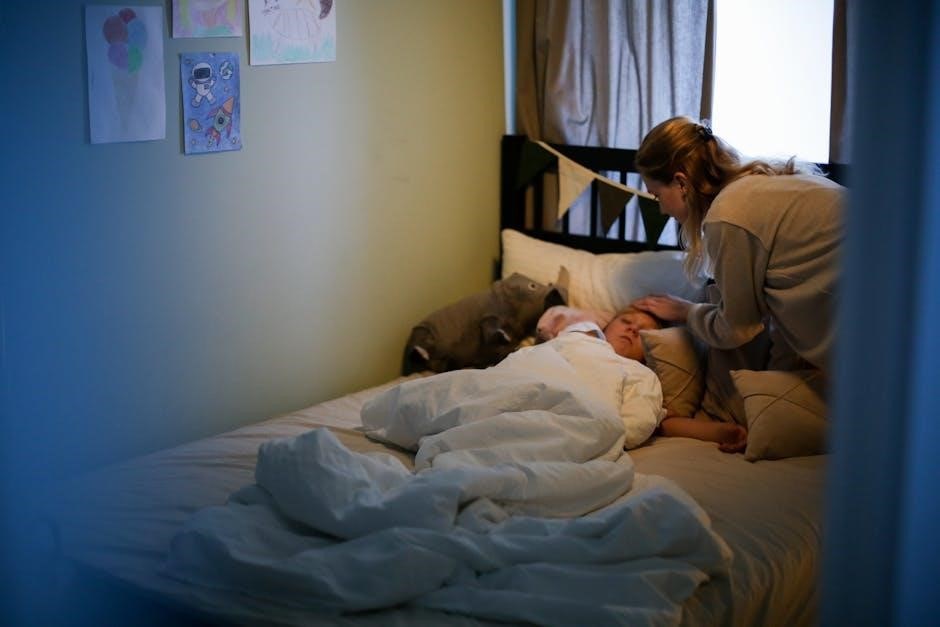The bond between a mother and daughter is profound, yet some daughters face emotional challenges when their mothers struggle to show love. This guide offers a compassionate path to healing and understanding.
The Importance of the Mother-Daughter Bond
The mother-daughter bond is a cornerstone of emotional well-being, shaping a woman’s life in profound ways. It influences self-esteem, emotional resilience, and relationship patterns. A loving mother provides validation, support, and a sense of security, helping her daughter navigate life’s challenges. When this bond is strained or absent, it can lead to deep emotional wounds. This guide highlights the significance of understanding and healing this relationship, offering tools to address the pain and transform the bond. By exploring the dynamics of this connection, daughters can work toward reclaiming their emotional health and fostering healthier relationships in the future.
Understanding the Purpose of the Guide
This guide aims to provide daughters with a compassionate and practical roadmap to heal from the emotional wounds caused by mothers who struggle to show love. It seeks to validate feelings of pain and confusion while offering effective techniques for overcoming the legacy of insufficient mothering. By addressing the root causes of emotional distance and providing tools for self-compassion and boundary-setting, the guide empowers daughters to break cycles of emotional pain. It also emphasizes the importance of rebuilding self-esteem and creating a supportive network. Ultimately, the guide is a resource for transformation, helping daughters move toward a fuller, healthier life.

Understanding the Issue
Exploring why some mothers struggle to express love, this guide sheds light on the emotional distance and childhood trauma impacting mother-daughter relationships, offering insights for healing.

Why Some Mothers Struggle to Show Love
Some mothers struggle to show love due to unresolved childhood trauma, emotional unavailability, or stress. These factors can create a barrier to expressing affection, often unintentionally. Many mothers who can’t love were raised in environments where emotional needs weren’t met, leaving them ill-equipped to nurture their own children. Depression, anxiety, or past abuse can also contribute to emotional distance. Society’s expectations and personal insecurities may further complicate their ability to connect. Understanding these root causes is crucial for daughters seeking healing and closure. Recognizing that a mother’s inability to love often stems from her own pain, not the daughter’s worth, is the first step toward emotional freedom and growth.
Signs of an Emotionally Absent or Unloving Mother
An emotionally absent or unloving mother often exhibits signs such as emotional distance, lack of warmth, and unresponsiveness to her daughter’s needs; She may appear disengaged, showing little interest in her daughter’s life or feelings. This can manifest as dismissive behavior, such as minimizing her daughter’s emotions or avoiding conversations about personal struggles. In some cases, she may prioritize other responsibilities or relationships over her daughter, leaving her feeling unseen or unimportant. Over time, this emotional neglect can create a sense of isolation and low self-worth in the daughter, highlighting the profound impact of a mother’s absence on her child’s emotional well-being and development.
The Role of Childhood Trauma in Mother-Daughter Relationships
Childhood trauma often plays a significant role in shaping mother-daughter relationships, particularly when a mother struggles to express love. Unresolved trauma from a mother’s past can manifest as emotional distance, creating a barrier between her and her daughter. This trauma may stem from her own upbringing, past abuse, or unresolved emotional pain, which she unknowingly carries into her parenting. As a result, her daughter may experience a lack of emotional support, leading to feelings of abandonment or low self-worth. Recognizing this intergenerational cycle of pain is crucial for understanding why some mothers cannot love in the way their daughters need. Acknowledging this trauma is the first step toward healing and breaking the cycle.

The Emotional Impact on Daughters

Daughters of emotionally absent mothers often experience profound emotional pain, including feelings of abandonment, low self-esteem, and difficulty forming healthy relationships due to unmet emotional needs.
Psychological Effects of Growing Up Without Maternal Love
Growing up without maternal love can lead to deep emotional scars, including feelings of isolation, abandonment, and low self-worth. Daughters often struggle with self-esteem, fearing they are unlovable or inadequate. This emotional deprivation can manifest as anxiety, depression, or difficulty trusting others, as the absence of a nurturing figure disrupts healthy attachment patterns. Many experience internalized shame, believing they are to blame for their mother’s inability to love. These psychological wounds can linger into adulthood, affecting relationships and overall well-being. Recognizing these effects is the first step toward healing, as outlined in guides like Mothers Who Can’t Love, which offers tools to address and overcome these profound emotional challenges.
Self-Esteem Issues and Identity Struggles

Daughters of emotionally absent mothers often grapple with profound self-esteem issues, feeling unlovable or inadequate. Growing without maternal validation can lead to identity struggles, as they may question their worth and purpose. This emotional void can manifest as people-pleasing or an intense need for external validation to fill the inner emptiness. Difficulty trusting others and forming healthy relationships may arise, as the absence of maternal love disrupts the development of a secure sense of self. These challenges can persist into adulthood, making it hard to define personal boundaries or recognize one’s own needs. Healing requires addressing these deep-seated insecurities and rebuilding a positive, compassionate self-image, as explored in guides like Mothers Who Can’t Love.
Attachment Problems and Relationship Challenges
Daughters of mothers who struggle to show love often experience insecure attachment styles, leading to challenges in forming healthy relationships. Difficulty trusting others, fear of abandonment, or becoming overly dependent are common outcomes. These attachment issues stem from the lack of a nurturing and consistent maternal bond, which is crucial for developing emotional security. As adults, they may struggle with intimacy, setting boundaries, or recognizing unhealthy patterns in relationships. Healing requires addressing these attachment wounds and learning to recognize and pursue emotionally fulfilling connections. This process involves rebuilding trust in oneself and others, a journey explored in-depth in resources like Mothers Who Can’t Love.

Healing and Recovery
Healing from a mother’s lack of love involves acknowledging pain, breaking harmful cycles, and embracing self-compassion. It’s a journey toward emotional freedom and self-love.
Acknowledging and Mourning the Mother You Needed
Acknowledging the emotional absence of a mother is a crucial step in healing. It involves recognizing the pain of not receiving the love and nurturing one deserved. Mourning this loss allows daughters to process unmet emotional needs and grieve the mother they wished for. This step is not about blaming but about validating feelings and accepting reality. It creates space for releasing pent-up emotions and embracing the truth, which is essential for moving forward. Mourning fosters self-compassion and understanding, helping daughters let go of unrealistic expectations and focus on their own healing journey. It’s a powerful foundation for rebuilding self-worth and finding peace.
Breaking the Cycle of Emotional Pain

Breaking the cycle of emotional pain requires recognizing patterns passed down through generations. Daughters must acknowledge how their mother’s inability to love has shaped their beliefs and behaviors. This awareness is the first step toward freedom. By understanding the root of the pain, individuals can begin to release the burdens of the past. Seeking support, whether through therapy or trusted relationships, is vital. Practicing self-compassion and challenging negative self-talk help dismantle harmful cycles. Healing involves choosing to respond differently, fostering healthier emotional responses. Breaking the cycle empowers daughters to create a new legacy, one rooted in love, self-worth, and emotional freedom.
The Power of Self-Compassion in Healing
Self-compassion is a powerful tool in the healing journey for daughters of emotionally absent mothers. It involves treating oneself with kindness, understanding, and patience, much like one would support a close friend. By embracing self-compassion, individuals can counteract the negative internalized messages from their upbringing. This practice fosters a sense of safety and self-worth, allowing daughters to release the burden of shame and self-criticism. Mindfulness and self-kindness help create a nurturing inner environment, replacing the emotional void left by maternal unavailability. Self-compassion empowers daughters to rebuild their sense of identity and develop a healthier relationship with themselves, paving the way for lasting emotional healing and growth.

Practical Steps for Healing
Setting clear boundaries, seeking therapy, and building a support network are vital steps for daughters to heal emotionally and rebuild their sense of self effectively.
Setting Boundaries with Your Mother
Setting boundaries with an emotionally absent or unloving mother is crucial for emotional well-being. It involves clearly defining limits on her behavior and communicate them assertively.
These boundaries help protect daughters from further emotional harm and create space for healing. Learning to say “no” and prioritizing self-care are essential steps.
Boundaries are not about cutting ties but establishing mutual respect and emotional safety. They empower daughters to break free from toxic patterns and focus on their own needs.
This process, while challenging, is a powerful step toward reclaiming personal power and fostering healthier relationships.
Seeking Therapy or Counseling
Seeking therapy or counseling is a vital step in healing from the emotional wounds caused by an unloving mother. A trained therapist can provide a safe, non-judgmental space to explore complex emotions and patterns.
Therapy helps daughters process feelings of abandonment, shame, or confusion, offering tools to rebuild self-esteem and develop healthier relationship patterns.
It also provides guidance in understanding the root causes of the mother’s behavior, which can reduce feelings of guilt or responsibility.
Through therapy, daughters can learn to release emotional burdens and cultivate self-compassion, fostering a stronger sense of identity and resilience.
Building a Support System of Loved Ones and Peers
Building a support system of loved ones and peers is essential for healing from the emotional wounds of an unloving mother. Surrounding yourself with empathetic friends, family, or support groups can provide validation and understanding.
Sharing your experiences with others who have faced similar challenges can help you feel less isolated and more supported.
A strong support system can also offer practical advice and encouragement as you navigate your healing journey.
Additionally, connecting with others who understand your pain can foster resilience and remind you that you are deserving of love and care.
This network becomes a source of strength, helping you rebuild your sense of self and confidence.

Rebuilding Your Sense of Self
Rebuilding your sense of self involves rediscovering your values, interests, and strengths, allowing you to move beyond the limitations of an unloving mother’s influence and embrace a fulfilling life;
Rediscovering Your Needs and Desires
Rediscovering your needs and desires is a powerful step in healing from an unloving mother. Many daughters struggle to identify their own wants due to a childhood focused on meeting their mother’s expectations. This process begins with self-reflection, allowing you to reconnect with your true self. Journaling, therapy, or mindfulness practices can help uncover buried desires and emotions. Understanding your needs empowers you to set boundaries and prioritize self-care, fostering a sense of autonomy and self-worth. By reclaiming your identity, you break free from the limitations imposed by an emotionally absent mother, embracing a life aligned with your authentic values and aspirations.
Developing Healthy Self-Care Practices
Developing healthy self-care practices is essential for daughters healing from emotionally absent mothers. Self-care goes beyond pampering; it’s about nurturing your physical, emotional, and mental well-being. Start by identifying activities that bring you joy and comfort, such as exercise, reading, or creative pursuits. Establishing a daily routine that includes time for self-reflection and relaxation can help rebuild self-worth. Prioritizing sleep, healthy eating, and mindfulness practices also supports emotional resilience. By committing to self-care, you create a foundation of love and acceptance that may have been lacking in your childhood, empowering you to live a fuller, healthier life.
Healing from a mother’s lack of love is a journey of self-discovery and embracing your worth. It’s a path to reclaiming your life and finding true fulfillment.
The Journey Toward Healing and Self-Love
Healing from a mother’s inability to love is a deeply personal and transformative journey. It involves acknowledging the pain, mourning the loss of the mother you deserved, and embracing self-compassion. By breaking cycles of emotional pain, daughters can rebuild their sense of self and develop healthier relationships. This process often requires setting boundaries, seeking therapy, and building a supportive network. Through this journey, daughters can learn to prioritize their own needs, practice self-care, and cultivate a stronger, more loving relationship with themselves. Ultimately, healing allows them to move forward, embracing a life filled with purpose, self-love, and emotional fulfillment.
Embracing a Fuller, Healthier Life
Embracing a fuller, healthier life after healing from a challenging mother-daughter relationship involves rediscovering personal passions and fostering meaningful connections. Daughters can cultivate joy by pursuing activities that bring fulfillment and surrounding themselves with supportive loved ones. This phase of life is about reclaiming identity, building resilience, and nurturing a positive self-image. By letting go of past hurts and embracing new experiences, daughters can create a life rich in purpose and happiness. This journey not only heals old wounds but also opens doors to a future filled with love, growth, and self-acceptance, allowing them to thrive in all aspects of life.

